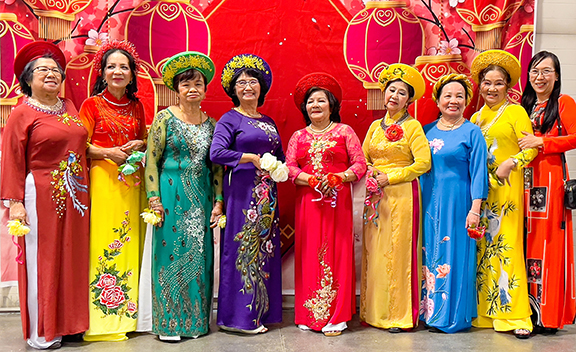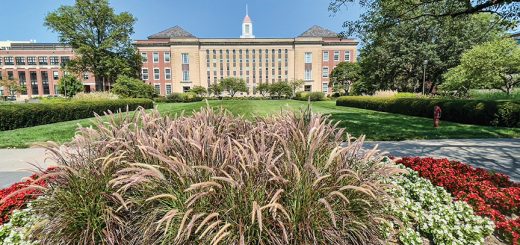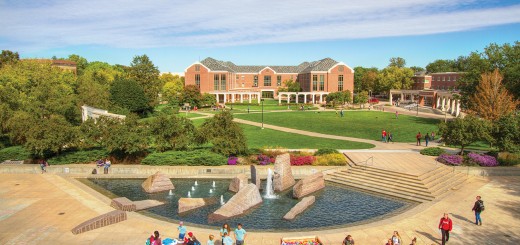Cultivating Diversity

Lincoln’s Multifaceted Cultural Centers
by Sriyani Tidball
Over the past decades, Lincoln’s cultural landscape has undergone a significant transformation, owing to its status as a melting pot for various cultures, each with its distinct hubs. The centers serve as vital resources for the numerous immigrants and refugees who have found solace in our hospitable city and stand as a testament to the remarkable diversity that enriches Lincoln.
The dynamic growth and recent surge of immigrants have left an indelible mark on local neighborhoods. Immigrants and refugees infuse fresh vitality into the urban fabric by establishing businesses, sharing their cultural heritage, and rejuvenating once-dormant areas. As early as the 1980s, the influx of refugees began reshaping the demographic landscape of Lincoln and Lancaster County. Remarkably, Lancaster County stands as the 18th most prominent destination in the United States for resettling Asian refugees and immigrants, a fact highlighted by the Asian Community Center.
In recent times, Lincoln has extended a warm embrace to significant cohorts of refugees from Afghanistan and Ukraine. Nebraska has emerged as a leading destination for refugee resettlement per capita, ranking fifth among states with comparable populations.

The Sangre Azteca dancers have trained more than 230 dancers over the past 20 years. Today the troop has 20 members ages five through adult. Proyecto Cultural Project started in April 2002 as an educational project to share the Hispanic Culture in Lincoln, bringing a taste of Mexico through authentic dances, costumes and extraordinary talent.
The infusion of Asian and Latino stores, markets, and eateries has injected newfound economic vigor into previously overlooked neighborhoods. Thanks to these ethnic enclaves, Lincoln’s inhabitants now enjoy ready access to delectable offerings like falafel sandwiches, flavorful pho bowls, and delightful bubble tea. Today, what was once considered exotic vegetables have seamlessly transitioned into mainstream fare available at everyday supermarkets throughout Lincoln. The city’s culinary landscape boasts a plethora of exceptional choices when it comes to ethnic dining. Should your palate yearn for Indian cuisine, a diverse array of upscale Indian restaurants awaits your selection (I have an affinity for The Oven). For fans of Thai flavors, the city hosts a variety of four restaurants, with the downtown-based Blue Orchid holding a special place in my heart. Many Korean, Japanese, Vietnamese, African, Middle Eastern, and authentic Mexican eateries and all-you-can-eat sushi places are scattered across the cityscape.
An impressive array of over 30 distinct language groups within the Lincoln Public Schools finds representation at the elementary level. Expanding on this linguistic diversity, individuals can acquire Spanish proficiency at the Hispanic Community Center, delve into Lakota at the Indian Center, and explore languages such as Chinese, Japanese, Russian, and many more at the University of Nebraska-Lincoln (UNL).
The University of Nebraska-Lincoln (UNL) takes pride in its cutting-edge Jackie Gaughan Multicultural Center, a testament to the significance of diversity and cultural enrichment within education. Throughout the year, the center spearheads a multitude of cross-cultural events accessible to students and the broader Lincoln community. To further detail the Gaughan Multicultural Center and its associated events, please visit unions.unl.edu/jgmc.
Some of Lincoln’s more established ethnic groups also have their own community centers that are not exclusive but inclusive in sharing their differences with others. Here are some of the more prominent community centers in the city.
Established in 1969, the Indian Center, Inc. was created to deliver essential services to Nebraska’s Native Americans and other residents of Lincoln, encompassing realms such as food commodities, housing, cultural preservation, employment, and healthcare support. Their fundamental objective revolves around bestowing value upon the Native American community, achieved through developing and acquiring programs that foster self-sufficiency and elevate the overall quality of life for individuals and families.
Engaging activities, including art exhibitions and Lincoln-based pow-wows, are part of the center’s repertoire. Since its inception, the Indian Center has undeniably become an indispensable component of Lincoln’s human service network, catering not only to Native Americans but also to individuals from diverse backgrounds. For further details, please explore indiancenterinc.org.
Initially established in 1955 as a result of the reorganization of the Lincoln Urban League, the Clyde Malone Community Center transcends its role as a mere community hub. Its programs and endeavors extend beyond its physical space, reflecting a commitment to eradicating multigenerational poverty.
Over 66 years, Malone has been a stalwart provider of comprehensive services to nearby families, youth, and the broader Lincoln community. Their offerings span inclusive social engagement, cultural enrichment, educational support, employment opportunities, and welfare services. With a resolute mission to break the cycle of multigenerational poverty and a visionary objective of fostering unity and prosperity within Lincoln, the center continually adapts its programs to cater to the evolving needs of local neighborhoods. Simultaneously, it works towards harmony and prosperity throughout the city while celebrating and respecting African American heritage. The Clyde Malone Community Center is embarking on a $20.7 million capital campaign, a crucial endeavor to renovate its aging facility and elevate its services to greater heights. For further details, explore www.malonecenter.org.
Established in 1982, El Centro de las Americas initially operated from the residence of a parishioner within Lincoln’s Spanish-speaking Catholic community. Today, the center has evolved to offer a spectrum of educational and cultural endeavors. El Centro de las Americas is deeply engaged with the Latino-Hispanic community, and attracts thousands of visitors seeking its services and emergency assistance. The city’s special events calendar includes the much-anticipated Hispanic Heritage Festival every September, traditionally held at Antelope Park. The center exudes an inviting atmosphere, making it a splendid gathering spot for those whose primary language is Spanish. Further information is available on their website, accessible at www.elcentrodelasamericas.org.
The Asian Community and Cultural Center caters to Asian refugees and established members of Lincoln’s rapidly expanding Asian community. The center has initiated the Fusion Project to facilitate the seamless integration of new refugees into their newfound homes in Lincoln. This innovative endeavor collaborates closely with various refugee groups, fostering the development of an educated and culturally vibrant community that benefits all residents of Lincoln.
Dedicated to supporting and empowering refugees and immigrants, the Asian Community & Cultural Center offers a diverse range of programs and services. Beyond hosting activities such as Chinese Tai Chi Chuan (martial arts) classes, the Japanese Aki-Matsuri Fall Festival, and the Lion Dance Troupe (a traditional dance form), the center has curated initiatives to share every facet of Asian culture. For those seeking more information, the center’s website is accessible at www.lincolnasiancenter.org.
Yazidi Cultural Center (YCC) Situated at 300 N. 27th Street, the YCC is an integral component of the larger nationwide entity known as Yazda, which is committed to fostering a nurturing community for Yazidi refugees. Within Lincoln, this center’s presence has contributed to establishing the world’s largest Yazidi refugee community. Despite its modest team, YCC is dedicated to equipping refugees with a foundational understanding of American rights and assisting them in their journey toward citizenship. Their efforts extend further with English and Kurmanji (Northern Kurdish) language classes, which ensures a continued connection to their cultural roots.
El Centro de las Américas and the Asian Community & Cultural Center provides complementary citizenship classes for permanent residents and green card holders. These classes can be attended either in person or through online sessions using Zoom. For those seeking to engage with Lincoln’s vibrant diversity, consider exploring two prominent cross-cultural organizations: the Cultural Centers of Lincoln Collaborative (culturalcentersoflincolncollaborative.com/) and the Good Neighbor Community Center (togetheronelincoln.org/good-neighbor-community-center/).



Recent Comments